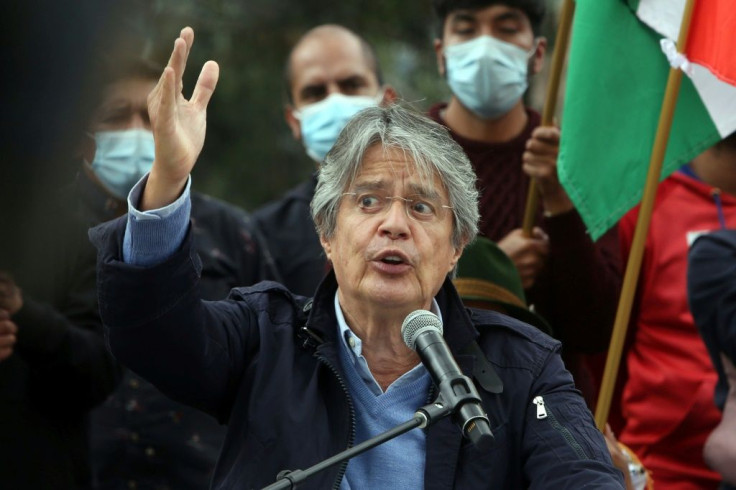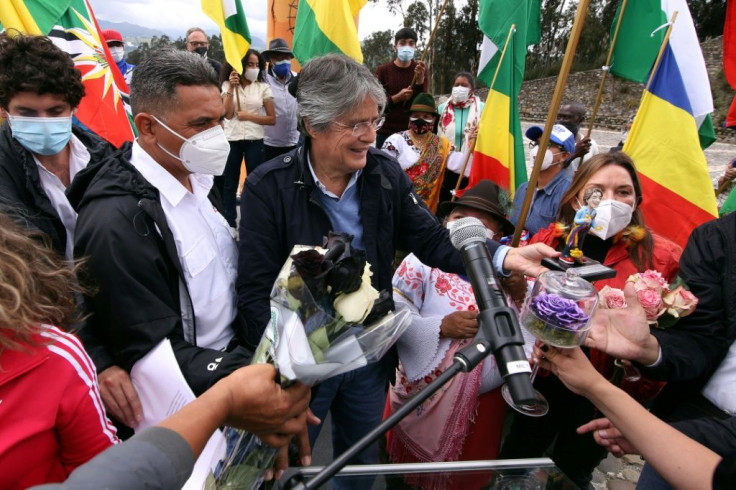Right-wing Candidate Lasso Aiming For Ecuador Political Unity
Sitting outside the oldest Catholic church in Ecuador, right-wing presidential candidate Guillermo Lasso says he's ready to work with anyone, including political rivals, to govern the country if elected in Sunday's second-round runoff.
The 65-year-old Catholic, who walks with a stick due to a spinal injury from a botched medical procedure, says he is even prepared to cooperate with his opponent Andres Arauz.
"I'm not ruling out an agreement with any Ecuadoran who acts in good faith, who understands the great objective to take the country forwards," Lasso told AFP following a meeting with members of the Puruha indigenous community in the central town of Colta.
Arauz is the protege of Rafael Correa, a leftist two-time former president who beat Lasso in the 2013 election but now lives in Belgium avoiding an eight-year corruption sentence.
"This won't be the government of Guillermo Lasso, of CREO (his Creating Opportunities right-wing movement), of one party in particular. It is a government of national unity, of meeting, of recognizing there are causes, there are struggles that we need to respect democratically even if personally we think differently," said Lasso
Two such areas in which the conservative politician says he is prepared to listen to others are abortion and LGBT adoption rights.

"I have my personal position but as president of Ecuador I will have to recognize that there are 17 million Ecuadorans with different ways of thinking. I will respect those ways of thinking."
Lasso has come under fire from environmentalists for his platform, with some critics branding his policies as "toxic," but Lasso insists he "respects" the environment.
"I've been clear in my conversations with environmental and ecological groups that the priority is to look after water, nature, life," said Lasso, who has pledged to continue oil exploration and mining.
"Ecuador is exploiting its resources but we will be careful to carry out environmental restoration because we cannot leave this planet without delivering it in a better state than we received it."

Indigenous groups have been particularly vocal in opposing Ecuador's oil and mining activities that have already devastated around one sixth of the country's Amazon jungle.
Lasso hopes to appease indigenous Ecuadorans, who make up seven percent of the population, by offering "respect for their culture, their customs."
"We're going to create an undersecretary of indigenous health, we'll also strengthen bilingual, multicultural education," he said.
But it's the economy that seems to be his primary focus along with "promoting investment to generate employment.
"Barely three out of every 10 working Ecuadorans have formal employment. Our goal will be to create two million jobs in the next four years of government and that way we'll have more than five in every 10 Ecuadorans working" formally, he said.
Unlike Arauz, Lasso is not focused on renegotiating a $6.5 billion loan with the International Monetary Fund, although there is one clause he feels strongly about, on value added tax (VAT).
"We won't increase VAT" from 12 to 15 percent, he said.
"I've been very clear on this and if the IMF has a prior agreement, that's a point that needs to change."
If elected Lasso will also face rising foreign debt that increased from 27 percent of GDP in May 2017 to 45 percent in January 2021, according to the central bank.
"Ecuador's debt (foreign and domestic) in general is hefty, we're talking about almost 70 percent of gross domestic product. If we want to solve the debt problem we have to manage the economy well and aim for zero deficit in the medium term to not take on more debt," he said.





















